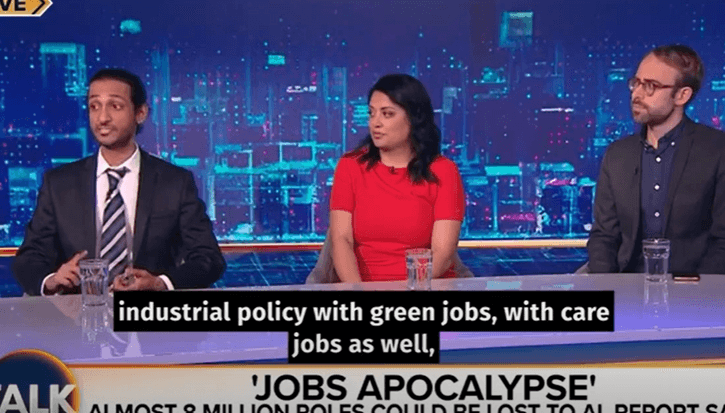Editorial: After the interregnum
Article
Summer holidays and a haul of gold medals at the Rio Olympics served to temporarily distract the British people from their decision to leave the European Union in the tumultuous days of June. But now Brexitland awaits, and the real business of negotiating Britain’s place in Europe and the world begins.
In this edition of Juncture, Helen Thompson traces the long pre-history of the Brexit vote. Her longue durée analysis roots the result in the UK’s anomalous, contradictory position within the EU: standing outside the monetary union that is so central to the European project’s economic and political credibility, yet acting as the offshore financial centre and employer of last resort of the bloc. Ultimately, that contradiction – and the social, democratic and economic tensions it generated – proved irresolvable. Yet we remain between Scylla and Charybdis, since Brexit, Thompson concludes, is unlikely to spring the UK from the traps that bedevilled its EU membership, its economy being at once too singular yet too integrated into Europe.
The traditional axes of politics are changing. As the renowned sociologist Colin Crouch argues, from the French Revolution onwards mass politics has revolved around two core conflicts: that between preferences for more or less economic inequality, and that between conservative, authoritarian values and liberal ones. Traditionally, economic and distributional concerns dominated political debate, at least in an increasingly secular western Europe. Yet, as the referendum attested, this has been challenged by a confluence of powerful forces – globalisation and immigration in particular – that have reasserted the importance of the struggle between authoritarian conservatism and liberalism. This will have momentous consequences for all the main political formations in advanced economies, with no political tribe looking to the future with any degree of comfort.
The geographic and class complexity of the referendum vote is arguably a portent of the reshaping of politics by these forces. Though it has been the focus of much attention, it wasn’t just a working-class revolt that drove the Brexit vote: the majority of Leave voters were middle class, with the south of England the area with the greatest absolute numbers in favour of Brexit. Age, crucially, mattered too. Demographics have become a new cleavage in British politics and, as Sarah Birch argues, the mobilisational effect of the referendum could potentially reshape politics in the decades ahead.
With almost two-thirds of those who voted in the referendum but not the 2015 general election ticking the ‘leave’ box, Brexit seems to have engaged groups that have long been estranged from parliamentary politics. At the same time, while older voters turned out in higher numbers, there was also a substantial increase in participation by younger voters relative to the general election – a trend that may be a harbinger of higher turnout in the future. The energy unleashed by the surge of participation – and the wrench of disappointment for Remainers – may yet, then, revitalise politics, though to whose benefit as yet remains unclear.
Britain’s new prime minister, Theresa May, will certainly seek to capture that energy to her advantage, and has used the Brexit vote to pivot towards a new Conservative agenda for economic policy, bringing industrial strategy to the fore. Will it work?
In this edition, we publish a major essay by the leading political economist Wolfgang Streeck. He argues that capitalism is ending, and that we are living through the dawn of a post-capitalist interregnum – a prolonged period of social entropy, economic stagnation, radical uncertainty and indeterminacy, in which society is essentially ungovernable and no new world order waits in the wings. Building on his acclaimed analysis of the evolving nature of the fiscal state and capitalism’s changing relationship to democracy, his sweeping essay paints a dystopian vision of the future – and offers a robust challenge to the reformism of the ‘varieties of capitalism’ tradition of political economy.
A more optimistic view of the global future is set out by Toby Nangle. Increasingly heterodox and expansive monetary policies have, since the crash, failed to generate sustainable growth, with labour’s bargaining power weak and living standards stagnant. Yet despite this, he argues that global demographic trends intersecting with monetary policy shifts offer a lifeline: the historic glut of global labour will be reversed in the 2020s, providing a momentary tailwind to labour power, acceleratingeconomic convergence and constraining rising inequality.
Meanwhile, the campaign for the US presidency enters its final phase. Hillary Clinton looks set to win. How will Clintonomics differ this time around? Bill Clinton governed in a ‘third way’ register during the goldilocks years of steady growth. If Hillary captures the White House, she will preside over a post-crash economy in which growth, employment and productivity rates are lower than in the 1990s, and in which demands for justice and fairness are far louder. Heather Boushey, executive director of the Center for Equitable Growth and author of Finding Time, sets out the key economic policy objectives and policy instruments on which Clinton is campaigning for the presidency.
In the mid-1990s, the British centre-left looked across the Atlantic to draw lessons about how it could return to power. It is unlikely to do so now. The Labour party remains locked in a death struggle over its leadership and future direction that is likely to last some time. Meanwhile, Theresa May will soon start the gargantuan task of negotiating the terms of Brexit. Whatever happens to the UK’s party politics in the near future, Brexit will absorb the political, intellectual and diplomatic resources of the country for years to come. Yet progressives must not lose sight of the broader seismic shifts traced in this issue if they are to begin the long road to renewal.
Mathew Lawrence, Guy Lodge, Nick Pearce and Carys Robert
This article appears in edition 23.2 of Juncture, IPPR's quarterly journal of politics and ideas, published by Wiley.
Related items

Forging ahead: Deciding the direction of IPPR's Migration Policy Unit
In our last blog post for the Migration Policy Unit we shared our new way of working as we endeavour to be inclusive and transparent in our policymaking process. In this blog we set out what our first and flagship project is for the policy…
Who gets a good deal? Revealing public attitudes to transport in Great Britain
Transport isn’t working. That’s the message from the British public. This is especially true if you’re on a low income, disabled or living in the countryside. The cost of living crisis has exposed the shortcomings of our transport system,…
Bhargav Srinivasa Desikan on TalkTV discussing AI
IPPR's Bhargav Srinivasa Desikan on TalkTV discussing his new report on the impact of generative AI on the UK labour market.